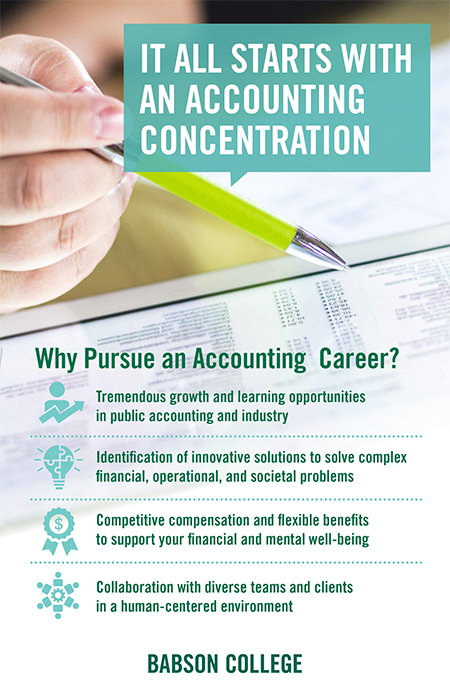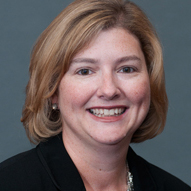
Discover All the Places You'll Go!
There are so many ways our alumni have used their accounting concentration. Explore the many career paths available to you.
When you study accounting, you prepare yourself for a bright future.
The accounting concentration offers a versatile course of study, setting you up for success in a wide range of careers in public accounting and industry. As close to an accounting bachelor’s degree as possible, the concentration provides preparation for the certified public accountant (CPA) exam, as well as accounting positions in audit, tax, forensic accounting, mergers & acquisitions, corporate accounting and internal audit. You will learn to be an accountant and can pursue these roles in any industry, such as biotech, financial services, technology, retail, and many others. This is a dynamic profession with a wide range of opportunities.
Do you dream about a job where you do something different every day? Then accounting is for you. You will advise clients, mentor team members, present to the board of directors, participate in industry events, pitch to a new client, recruit new talent, [and] learn the most cutting edge technologies.

There are so many ways our alumni have used their accounting concentration. Explore the many career paths available to you.
Comparable to an undergraduate accounting degree, you will graduate with extensive knowledge of accounting fundamentals, deep understanding of accounting concepts, and hands-on experience with financial planning and data analytics. You will develop critical thinking and analytical skills that will prepare you to solve financial, operational and societal problems. You will also collaborate with diverse teams and clients in a human-centered environment and become a trusted advisor.
Our accounting program provides the foundation for taking the CPA exam and becoming a CPA. However, the educational requirements to become a licensed CPA vary by state and typically require more accounting credits than this concentration provides. Since most states require 150 total credits of education, careful planning is essential. If this is your professional path, your advisor and the accounting faculty will work with you to ensure that you complete the necessary courses. The National State Boards of Accountancy provide details of the requirements to sit for the CPA exam in each state.
Because of the nature of this concentration, three foundational courses are required of all accounting concentration students. You then supplement those courses with at least one elective.
When you study accounting, you will take three courses to build a strong foundation in accounting principles.
Broaden your understanding of financial accounting concepts and understand the judgements involved in accounting. Topics include revenue recognition, earnings management, non-GAAP earnings, accounts receivable, inventory, intangible assets, and property and equipment.
This course expands your knowledge base. Topics include statements of cash flows, investments, debt, leases, stock-based compensation, and shareholders’ equity.
As the culmination of your work in ACC 3500 and 3501, this course deepens your study in financial accounting concepts and techniques Topics include business combinations and the consolidation of domestic and foreign subsidiary companies, foreign currency translation and hedging with derivative financial securities, accounting for variable interest entities (VIE), and accounting for partnerships. This course is intended primarily for students whose concentration is accounting, but it compliments well also for those who are planning careers requiring in-depth knowledge of advanced financial accounting.
Choose at least one course from the following:
Improve your ability to critically analyze data in order to make better business decisions and communicate this information effectively to your audience. You will learn how to use analytics tools and software (Tableau and Alteryx) from the lens of a manager, a financial statement user, a tax analyst, an auditor, and a forensic accountant. The course also provides an opportunity to interact with professionals in the field.
This course develops an understanding of the philosophy of the audit process and its practice. Primary emphasis is placed on issues relevant to external auditing professionals, such as the economic and social implications of auditing, audit risk analysis, planning of audit engagements, testing procedures, and the evolving use of data analytics throughout the audit process.
The experience you gain from running your own business in Foundations of Management & Entrepreneurship (FME) in your first year coupled with what you pick up from managerial accounting (ACC 2002; MAC) only elevates what you learn in this course. Through case studies and real-world examples, you will learn and analyze advanced issues relating to costing systems, strategic cost management, and management control. This course will equip you with the necessary tools to understand how “costs” are central to your day-to-day business decision makings in order to be a successful entrepreneur.
The name says it all. As much as 20-25% of most US companies’ income goes to pay federal and state income taxes and more tax is paid in the form of payroll, excise and sales taxes. Individuals can find themselves paying as much as 50% in federal and state income and payroll taxes. Understanding the tax rules will provide businesses, individuals, and their advisors the knowledge to legally minimize taxes as they make business and personal decisions. This course covers the taxation of individuals, businesses, estates, and gifts, including the treatment of income, deductions, and credits, and capital gains and losses. The course also will cover how tax disputes are handled and the ethical responsibilities of taxpayers and their advisors.
To understand tax policy and its history is to truly understand the tax system and become a better tax decision-maker. This course investigates how governments raise revenues, the history of U.S. tax policy, the design principles of good tax policy, and the tax policy choices of other countries. The course links these discussions to current events and emerging issues in social and economic policy; to apply the learning, students will select and analyze in depth a tax policy issue or proposal of their own choosing (examples: carbon taxes, wealth taxes, taxation of cryptocurrency).
Explore the entire list of accounting courses
At Babson, our faculty are experts, innovators, and forward thinkers in their chosen fields. Here are just some professors sharing their expertise and support with our students.

Weerapat (Go) Attachot teaches undergraduate-level managerial accounting. His research interests lie primarily in the international financial accounting and reporting arena. Specifically, Attachot is interested in publicly traded foreign (non-U.S.) firms’ characteristics, regulation compliances, regulation choices, incentives/disincentives etc. in the U.S. capital markets. He is a certified public accountant (CPA), a certified internal auditor (CIA), a certified management accountant (CMA), a certified fraud examiner (CFE), and a chartered global management accountant (CGMA).

Prior to joining Babson, Shay Blanchette was an Assurance Partner with the Boston PricewaterhouseCoopers Private Company Services Practice. She has over twenty years of experience in public accounting, serving a wide range of companies in the retail, manufacturing, and professional services industries. She was also the PwC Babson recruiting partner where she hired many students from Babson.

Julia’s teaching focuses on managerial accounting and accounting analytics. She has taught in undergraduate, graduate, and executive education programs. Her research explores emerging technologies in accounting, including AI and Robotic Process Automation. She is a CPA and worked as a staff accountant in tax and a senior auditor prior to joining academia. She is passionate about entrepreneurship and small business management.
Faculty Contacts: Go Attachot, Shay Blanchette ’90, MBA’13, and Julia Kokina
Sponsoring Division: Accounting & Law